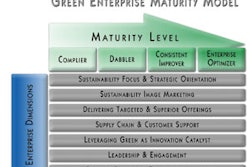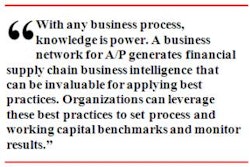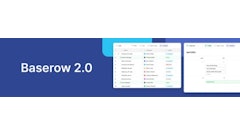Current events have converged to create an era of unprecedented opportunity for public sector procurement professionals. In this singular time, innovative thinking and new ways of working have emerged that have the potential to change the very fabric of government and provide taxpayers with the transparency and accountability they demand and deserve.
How government agencies approach procurement and spend money, of course, is of prime concern to the public – a tradition that stems from our first citizens’ success drawing a direct correlation between fiscal responsibility and effective government. What makes our current situation different is that for the first time technology is available that promises to fundamentally change how agencies purchase goods and services. These new tools necessitate the development of skills never before utilized in public sector procurement.
To fully appreciate this shift, one has to look at the status quo. In the United States, federal agencies, states, counties and municipalities typically do not have real-time visibility into spending. Few have a keen grasp on who is making purchases, what those purchases are for or the price paid – let alone the enterprise-wide view required to aggregate buying power or implement strategic sourcing initiatives like those found in the private sector.
Until recently no technology existed to allow agencies with numerous offices and departments in scattered locations to make their purchases electronically on one system. And with so many agencies, offices and people involved the complete integration of traditionally deployed e-procurement software simply wasn’t viable.
As a result, most agencies can’t manage their supply and demand chains effectively and lack the ability to truly enforce contract compliance. This is evidenced by inappropriate purchases, which, while rare, tarnish entire agencies with the misdeeds of a few individuals.
A March 2008 report from the Government Accountability Office (GAO) on government purchase cards underscores the reality of this situation. Among its findings, the GAO noted that agencies could not demonstrate that 48 percent of transactions over $2,500 met the standards of “proper authorization, independent receipt and acceptance, or both.” Clearly, the public sector’s lack of visibility into spending is a problem, particularly when one considers that such a limited view is only accomplished through a time-consuming, after-the-fact process.
With the Internet this can and will change. On-demand e-procurement solutions that empower agencies to bring all spending under management on one system for the first time represent a paradigm shift in how governments utilize procurement automation technologies. Users, no matter where they are located, simply log in and shop in an online marketplace similar to popular e-commerce sites. The software automates related workflow – including the distribution of electronic requisitions for approval – in a process that is transparent for all involved. Its unique architecture, available without costly custom software, is also far less expensive to implement and maintain.
Contract compliance can now be enforced. Orders that appear questionable are flagged electronically for review. Perhaps most importantly, such systems enable agencies to truly aggregate their buying power and empower government financial leaders to know how public funds are being used right now.
The State of Georgia – Procurement Transformation and a Demand for New Skills
As part of Governor Sonny Perdue’s mandate to operate the state of Georgia more like a business, the Department of Administrative Services is deploying such an e-procurement solution partially powered by SciQuest. The system will empower Georgia employees to quickly and easily access, review and purchase the goods and services they need online through state contracts in Team Georgia Marketplace, the state’s virtual shopping mall on the SciQuest network. Additionally, 159 counties and hundreds of municipalities will be able to utilize the system to piggyback off the state’s contracts, thus creating additional purchasing leverage at the local level. The system will be fully integrated with the state’s enterprise resource planning (ERP) and financial management systems.
Georgia’s efforts mark the first time a U.S. government entity has chosen to dramatically transform the procurement function to enforce contract compliance and make a more strategic, savings-oriented approach to procurement possible. At its core, the goal of Georgia’s efforts is simple: to increase the value of taxpayers’ dollars through the consolidation of buying power and the negotiation of more favorable terms and conditions with suppliers in return for the opportunity to compete for more of the state’s business.
Not surprising, this new approach calls for far-reaching skills and talents not normally associated with public sector procurement operations, which historically have served as processing centers. But even before the state could consider what skills were required, the law first had to change.
Like many states, it was unlawful for Georgia’s employees to negotiate with suppliers. In keeping with the bid system that is synonymous with government, state contracts were awarded to those suppliers that offered or predicted the lowest price. Additional negotiation was simply not allowed.
In late 2005, legislators in the state’s House of Representatives and Senate enacted HB 312 – a bill that allows Georgia’s procurement professionals to negotiate more favorable terms with suppliers submitting proposals in response to requests for proposals. This legislative action was crucial, for without it Georgia could not fully leverage the skills it planned to develop and attract.
With the authority to negotiate on behalf of the taxpayers, Georgia is now implementing its new procurement system. With it the state plans to transform its procurement operation from a processing and simple transaction function into the leading edge of the state’s efforts to generate savings. The new system will aggregate Georgia’s significant buying power – Georgia is the 17th largest economy in the world – and ensure compliance with the contracts that result.
Just what skills are required to transform government procurement into a strategic function? Public sector professionals will increasingly be called upon to exhibit the same abilities and business acumen celebrated in the private sector, where the focus on efficiency and savings is mature and expected, including:
- Strategic Sourcing Expertise: With the ability to aggregate buying power and see where spending occurs, it will become paramount for government procurement professionals to have the ability to leverage newly available data to identify strategic sourcing opportunities. These individuals will increasingly be reviewed not only on their ability to ensure that state contracts are utilized but also on the savings they generate through the sourcing decisions they make and the corresponding impact on the bottom line.
- Negotiation Expertise: While the act of negotiation is largely foreign in government procurement, more states will follow Georgia’s lead in giving procurement professionals the ability to negotiate beyond the issue of cost. Indeed, this will be crucial to ensuring that agencies continue to provide services as tax revenues fluctuate with economic conditions. In Georgia, Tim Gibney, assistant commissioner at the State Purchasing Division of the Department of Administrative Services – himself a veteran of private and public sector procurement – looked to an experienced private sector professional to serve as his director of strategic sourcing. The importance of attracting such talent will increase as the ability to maximize the value of public funds becomes paramount.
- Project Management Skills: As government emulates the private sector and pushes forward in its efforts to realize the efficiencies that result from new technologies and new ways of conducting public operations, the ability to ensure that projects are completed on time and under budget will increase in importance.
- Change Management Experience: As large-scale private sector initiatives reveal, the transformation of long-followed processes cannot be undertaken in a vacuum. It will be increasingly important for procurement professionals not only to manage change and achieve buy-in from employees but also to develop an environment that encourages people to learn new skills and provides them with the tools and support they need to succeed. In Georgia, the creation of a Strategic Sourcing Knowledge Center managed by a technology and management consulting veteran will ensure that such cultural change is as smooth as possible.
Of course, these are only some of the many new skills that will increasingly be seen as crucial attributes in government’s efforts to change its approach to procurement.
















